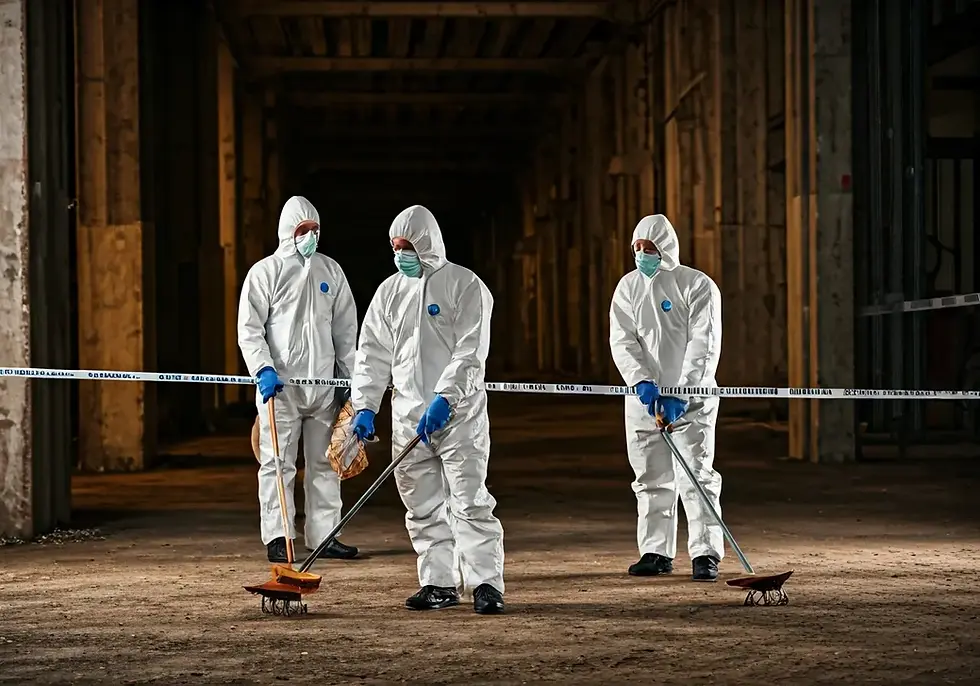The Essential Role of Industrial Cleanup Services in New Jersey
- BIODECON LLC
- May 28, 2025
- 4 min read
Industrial cleanup services play a crucial role in maintaining the safety, health, and sustainability of New Jersey's bustling industrial landscape. These services ensure that industrial waste is managed properly, protecting both people and the environment. In this blog, we'll dive into why these services are so essential and how they enhance the community's well-being.

Understanding Industrial Cleanup Services
Industrial cleanup services involve the management and disposal of hazardous waste generated by factories and plants. These services not only handle industrial spills but also manage the regular waste output of these facilities, ensuring compliance with state and federal regulations.
Many factories in New Jersey produce a significant amount of hazardous materials as a byproduct of their operations. This makes effective waste management an imperative part of maintaining environmental health. By leveraging advanced technologies and methodologies, industrial cleanup services can more efficiently treat, store, and dispose of these waste products. This not only minimizes the risk of environmental contamination but also ensures that companies adhere to state and federal environmental guidelines designed to protect our natural resources.
The role of an industrial cleanup service goes beyond traditional waste disposal. They are also instrumental in emergency response situations. New Jersey, with its dense network of industrial plants, benefits from quick and efficient response actions in the case of accidents or natural disasters that could lead to hazardous waste spills. Industrial cleanup professionals use their expertise to mitigate the impact of these events, ensuring that remedial steps are taken swiftly to protect the nearby communities and ecosystem.
The Importance of Compliance and Regulation
Adhering to environmental regulations is a major responsibility for industries in New Jersey. Industrial cleanup services help businesses comply with these laws, preventing costly fines and potential shutdowns while promoting a culture of safety and responsibility.
Ensuring compliance with regulations also involves continuous monitoring and reporting, which are critical aspects of industrial cleanup. New Jersey’s industrial entities are required to maintain detailed records of their waste management practices. This includes documenting the types and quantities of waste generated, the methods of treatment and disposal, and the protocols followed in the event of accidents. By providing specialized knowledge and administrative support, cleanup services facilitate easier compliance with complex regulatory requirements, allowing businesses to focus on their core operations without the anxiety of potential environmental infractions.
Furthermore, industrial cleanup services often play a consultative role, guiding businesses toward more sustainable practices. For instance, they might advise on the reduction of hazardous waste generated by suggesting more sustainable materials or production methods. This proactive approach not only helps in staying under regulatory radar but also aligns businesses with global sustainability goals, signaling their commitment to corporate responsibility and environmental stewardship. By taking these steps, companies can concurrently improve their operational efficiency and reduce their ecological footprint.
Enhancing Environmental Safety and Public Health
By effectively managing industrial waste, these services protect the local environment from contamination and pollution, helping to maintain clean air, water, and soil. This, in turn, safeguards public health and enhances the quality of life for New Jersey residents.
Industrial cleanup services play a vital role in preserving the health of New Jersey's communities. By preventing toxic contaminants from entering the environment, they ensure that the air we breathe and the water we drink remain free from pollution. For instance, proper waste containment measures prevent harmful substances from leaching into groundwater sources, which are critical for everyday consumption and agricultural use. In doing so, these services ultimately avert a myriad of health issues linked to pollution, ranging from respiratory ailments to more severe chronic conditions.
The presence of cleanup services also alleviates the burden on public health infrastructure by reducing disease and environmental hazards. By including health-focused and preventative waste management strategies, they indirectly contribute to savings in healthcare costs. Furthermore, by maintaining ecological balance, cleanup services also protect wildlife and natural habitats, supporting biodiversity that is vital for a resilient and sustainable ecosystem.
Supporting New Jersey’s Economy
Industrial cleanup is not just about safety and compliance. It's also a vital component of New Jersey’s economy. By ensuring that industrial facilities remain operational and compliant, these services support jobs and contribute to economic growth in the region.
A thriving industrial sector relies on the support of services that safeguard its processes and reputation. Industrial cleanup services provide the necessary infrastructure and expertise that allow businesses to operate without unforeseen environmental hindrances. This continuous operational support not only secures existing jobs but also encourages industrial expansion and attracts new investments into New Jersey. Moreover, the cleanup sector itself is a significant employer, offering a variety of roles from fieldwork to administrative and research positions, further bolstering the local economy and creating a ripple effect of prosperity.
Future Challenges and Innovations in Cleanup Services
As industries evolve, so do the challenges faced by cleanup services. With technological advancements and increasing environmental consciousness, these services are constantly innovating to improve efficiency and sustainability, ensuring a cleaner future for New Jersey.
The future of industrial cleanup is one replete with both promise and complex challenges. As industries integrate more technology into their processes and move towards automation, cleanup services must adapt by utilizing more sophisticated tools and methods. Innovations such as IoT-enabled sensors and data analytics are being deployed to enhance real-time monitoring of waste management processes, allowing for prompt diagnostics and interventions in case of irregularities. Such technologies not only streamline operations but also provide comprehensive data which aids in improving long-term waste management strategies.
Yet, with growth comes increased responsibility. The push towards sustainable and circular economies demands that cleanup services refine their strategies and adopt greener practices. This includes investing in research that fosters alternative waste treatment solutions and promotes the reduction, reuse, and recycling of waste materials. By pushing the envelope on innovation, industrial cleanup services in New Jersey are poised to set a benchmark for sustainability that aligns with the state’s long-term environmental objectives, ensuring a promising future for both the industry and the planet.
Appreciating the Unseen Heroes: Industrial Cleanup Services
In a state as industrious as New Jersey, the role of industrial cleanup services cannot be understated. They are the unsung heroes that keep our environment safe, our industries compliant, and our communities thriving. By appreciating and supporting these essential services, we contribute to a cleaner, safer, and more sustainable future for everyone. To find out more about how we contribute to a safer New Jersey, visit our homepage.




Comments